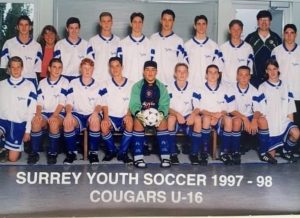Throughout the years of coaching, I have been on the front lines observing how society is constantly changing and how sports are evolving. In December 2019, I got a chance to go to Pittsburgh to see the NCAA final 4 in the sport of volleyball. This event was massive, with a huge coaching conference connected to the event. Taking everything in it provided a chance to learn more about the sport, learn more about different technologies within the sport, and to network with the various coaches/companies in the USA. I’m a strong believer that Canada is normally 5-10 years behind everything the states does regarding the industry of youth sports. Having a chance to network with various club “OWNERS” not directors, not volunteers…. “OWNERS” I got a very vivid realization on the “business of sport” within the USA.
Coming from a family of successful entrepreneurs, I have had the opportunity to observe many family members in their specific skill set which had positive influence to grow a business. My grandparents moved here with two suitcases back in the day and were able to build a successful Harley Davidson dealership which provided opportunity for my father and uncle but also myself and my brother. My grandfather is probably one of my biggest mentors, and I would always sit attentively in his office as he told me tricks of the trade. Even though owning a motorcycle dealership was not my specific calling I still refer back to these words of wisdom while coaching and running one of the largest volleyball clubs in Canada.
Back 20+ years ago I never got into sport to create a business. I went to college for a little bit where I played volleyball, but then moved onto trade school where I got my Journeyman plumbing ticket. After that I pursued my power engineering where I got my certification as well. Coaching was always a hobby, and it costed more money to coach then anything. A golf shirt and a possible gift card at the end of the year. Not ever expected but was graciously accepted. I never thought I would be here today in regards to coaching.
As society changes and expectations by players, and parents grows, the dynamic of youth sports has drastically changed. In Canada there are many mom/pop types of sports teams. These are the one/two team types of clubs and associations. Many reasons why these exist. Canada is not as populated as the states, funding, and other various reasons. Now 20 years later you see larger organizations in all sports. Hockey and Soccer are hugely popular and generate substantial amounts of money. The larger clubs/associations having head offices, their own buildings, and full-time employees. Volleyball is also heading that direction.
As numbers grow and the needs of the club/teams/parents/players/coaches increase there is no possible way of running such a sizable operation by only one volunteer. Being the face of such a large organization, I sit here on the daily trying to figure out my own way to keep the sport growing, keep the club growing, while managing an entirely different aspect to youth sport. A close friend and fellow coach who is extremely successful in the corporate world has been my sounding board for years. I would always ask him how do you do it? It wasn’t directed at anything related to the sport. With so many different people, personalities, expectations, needs, wants, the list goes on……. How do you manage them all? Can you keep them all happy? Calm and collected, he tells me its like being a zookeeper. There are many animals in the zoo and your job is to make sure they are all taken care of. You will never make them all happy, but the art is connecting with each and finding ways to get things done. Managing personalities.

So now I sit here with a board of directors, seventy plus coaches, six hundred parents, and try to manage the zoo. With an entrepreneurial spirit and a long-term vision, I trek down the path most coaches don’t. Keeping to a high ethical code and my coaching philosophy, I try and solve different situations and problems as they come. Through this journey I will make mistakes, but will always refer back to the long chats with my grandad This is not an easy job, but a job that reflects its success by the smiling faces in the gym and the constant growth of the association. This is my ZOO and I wouldn’t have it any other way.


